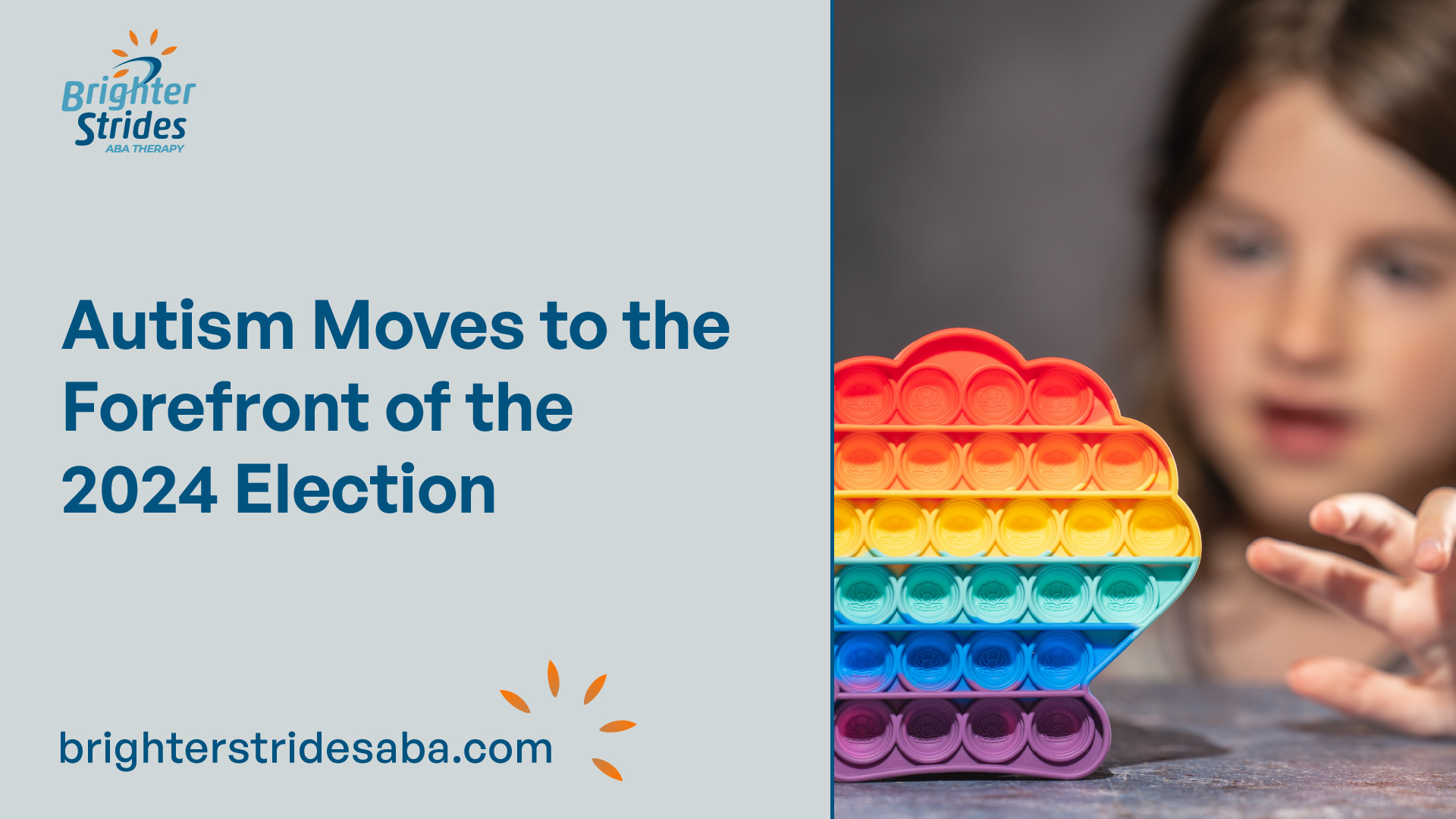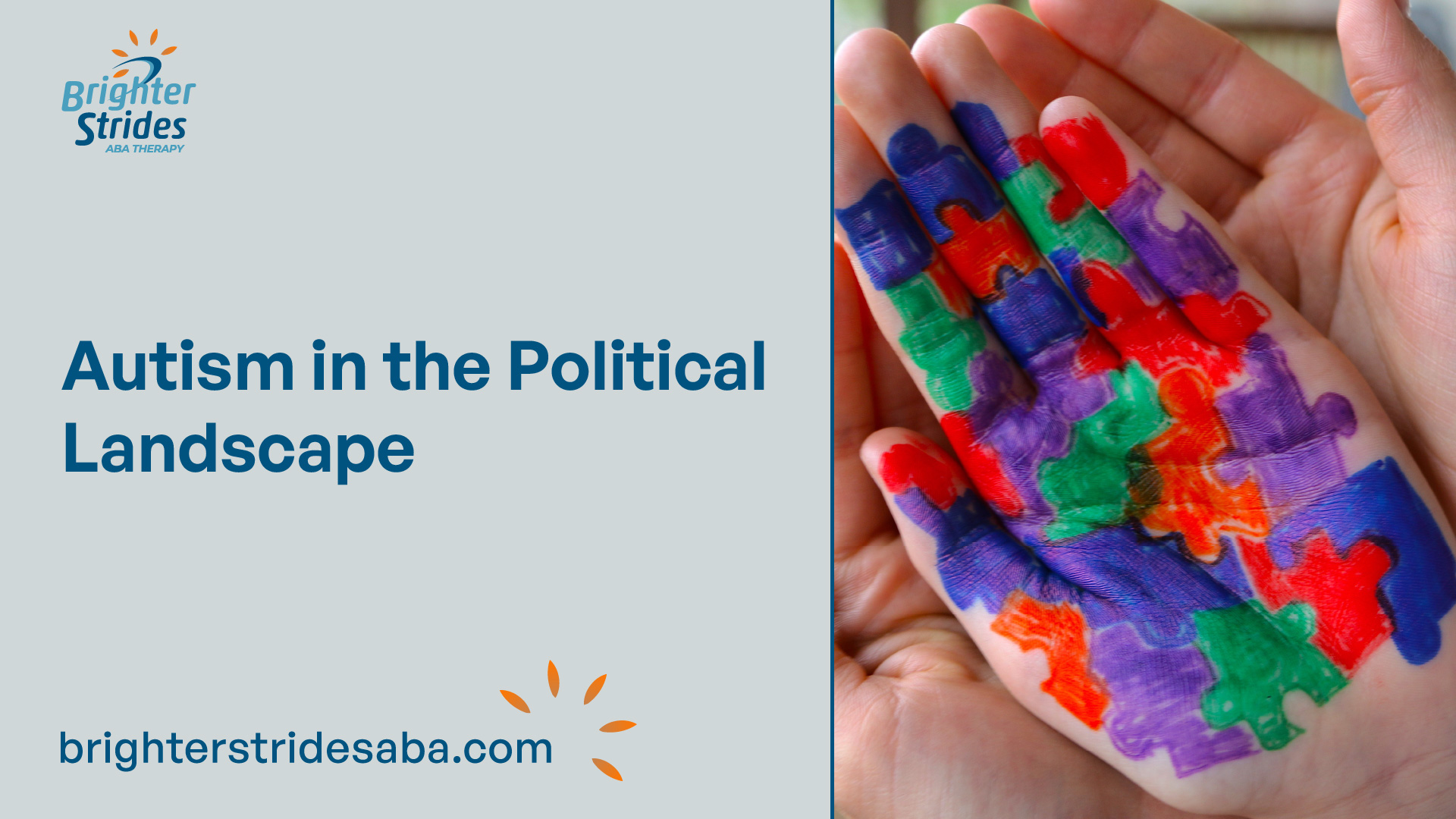Autism in the Political Landscape
Autism has emerged as a significant and pressing issue in the 2024 presidential election, demanding attention and discussion in the political landscape. The growing awareness of autism and its impact on individuals and families has led to increased expectations for political leaders to address these issues.

Autism Awareness in the 2024 Election
In recent years, there has been a notable increase in autism awareness, which has contributed to a better understanding of the challenges faced by individuals on the autism spectrum and their families. As a result, autism has moved to the forefront of the 2024 presidential election, with candidates being called upon to address the needs and concerns of the autism community.
Recognition by Political Parties
Both major political parties in the United States, the Democrats and Republicans, have recognized the importance of addressing autism-related issues in their platforms. While their policies and approaches may differ, the inclusion of autism in their agendas signifies the growing recognition of the impact of autism in society.
The Democratic Party traditionally advocates for increased funding for research, early intervention services, and mental health care for individuals with autism. Many Democratic candidates for the 2024 presidential nomination have released comprehensive plans for disability policies, including specific attention to issues affecting people with autism.
On the other hand, the Republican Party tends to prioritize policies that promote individual responsibility and self-sufficiency, including employment opportunities for adults with autism. While their focus may differ from that of the Democrats, they recognize the importance of providing opportunities for individuals with autism to lead fulfilling and independent lives.
The recognition of autism by both political parties reflects the growing understanding of the need to address the challenges faced by individuals with autism and their families. As the 2024 election approaches, the attention given to autism in the political landscape signifies a shift towards greater inclusivity and support for the autism community.

Autistic Politicians Making an Impact
In recent years, autistic individuals have been making their mark in the political landscape, bringing unique perspectives and insights to the table. Their presence in politics has led to a more inclusive and diverse representation, resulting in policies and contributions that address the needs and concerns of the autistic community.
Unique Perspectives in Politics
Autistic politicians offer a distinctive approach to policy-making and governance. They bring strengths such as a strong attention to detail, a sense of justice and fairness, and a direct and honest communication style. These qualities make them effective in research, analysis, problem-solving, and advocacy for social causes. By leveraging their unique perspectives, autistic politicians contribute to more well-rounded and thoughtful decisions.
Their ability to see patterns and connections that others may miss allows them to identify innovative solutions to complex problems. Autistic individuals often possess deep knowledge in their areas of interest, allowing them to provide informed insights and expertise on specific policy issues.
Successful Policies and Contributions
Autistic politicians have made significant contributions in various policy areas, championing causes that are important to the autistic community and beyond. Their policies and initiatives have focused on healthcare reform, disability rights, and education equity, among others. By drawing from their own experiences and understanding of the challenges faced by autistic individuals, they have been able to create policies that promote inclusivity, accessibility, and support for those on the spectrum.
In addition to policy-making, autistic politicians have also played a vital role in raising awareness and advocating for the rights of autistic individuals. Through their platforms and positions, they have been able to amplify the voices of the autistic community and push for greater understanding and acceptance.
By breaking barriers and excelling in politics, autistic politicians are challenging stereotypes and showing that neurodiversity should be embraced in all areas of society. Their contributions serve as an inspiration to others on the spectrum, demonstrating that their unique perspectives and abilities can make a tangible impact on the political landscape and beyond.
The rise of autistic politicians highlights the importance of inclusivity and representation in politics. As more autistic individuals enter the political arena, it is crucial to provide them with the necessary support, accommodations, and acceptance from colleagues and constituents. By fostering inclusive environments and embracing neurodiversity, we can create a political landscape that truly reflects the diversity of our society and ensures that the voices and perspectives of all individuals are heard and valued.
Challenges and Support for Autistic Politicians
Autistic politicians face unique challenges as they navigate the political arena. However, with the right support and accommodations, these challenges can be overcome, allowing them to contribute their unique perspectives and insights to the field of politics.
Navigating the Political Arena
Navigating the complex landscape of politics can present challenges for anyone, and autistic politicians may face additional hurdles. Some common challenges include difficulties with social cues, public speaking, and communication in large groups. However, with specialized coaching and support, these challenges can be addressed.
Autistic politicians can benefit from tailored coaching and guidance, focusing on areas such as public speaking and communication skills. By providing them with the necessary tools and strategies, they can effectively communicate their ideas and connect with constituents. Moreover, creating inclusive and accommodating political organizations and institutions is essential. By fostering an environment that embraces neurodiversity and offers support, autistic politicians can thrive and contribute their unique strengths to political discourse.
Accommodations and Inclusive Environments
Accommodations and inclusive environments are crucial to supporting autistic politicians in their political endeavors. Acceptance from colleagues and constituents is paramount, as it creates an atmosphere of understanding and respect. By promoting inclusivity, political organizations can ensure that autistic politicians have equal opportunities to participate and make a difference.
Inclusive environments involve adapting political processes and structures to accommodate the needs of autistic politicians. This may include providing additional time for processing information, allowing for alternative communication methods, or implementing sensory-friendly practices in political settings. By making these adjustments, autistic politicians can fully engage in political discussions and decision-making processes.
Support networks and mentorship programs also play a vital role in assisting autistic politicians. By connecting them with experienced mentors who understand their unique challenges, they can receive guidance and advice on navigating the political landscape. These support systems foster personal growth, confidence, and resilience, enabling autistic politicians to overcome obstacles and thrive in their political careers.
In conclusion, while autistic politicians may encounter challenges in the political arena, with the right support and accommodations, they can make significant contributions. By addressing their specific needs, providing coaching and inclusive environments, and fostering acceptance, the political landscape can become more diverse and representative of all individuals, including those on the autism spectrum.
Autism Insurance Mandates and Variations
In the United States, autism insurance mandates have played a significant role in ensuring access to necessary services for individuals on the autism spectrum. These mandates, which require insurance companies to cover services related to autism spectrum disorder (ASD), vary across states in terms of their generosity and impact.
State Mandates in the US
From 2001 to 2017, 46 states in the US passed mandates requiring insurance companies to cover services associated with ASD. However, the generosity of these mandates varies significantly across states. Some mandates ensure adequate medical care for all individuals with ASD, while others have more limited benefits, such as age caps on eligibility or low yearly covered medical costs. These variations in mandates impact the availability and extent of services for individuals with ASD and their families.
The generosity of these mandates is influenced by the ideology of state residents and politicians. Research suggests that states with more liberal citizens and increased Democratic control of state governments tend to offer more generous benefits. This indicates the influence of political and societal factors in shaping the extent of support provided to individuals with ASD.
Generosity of Benefits and Impact
The variations in the generosity of autism insurance mandates have significant implications for individuals with ASD and their families. More generous mandates that cover a wider range of services and have less restrictive eligibility criteria provide greater access to vital resources and support.
The presence and differences in mandate generosity can impact service utilization. For example, age caps on service eligibility have been found to significantly reduce health service use and ASD-related spending, particularly in outpatient settings. This highlights the importance of comprehensive and inclusive mandates that consider the lifelong needs of individuals on the autism spectrum.
Understanding the variations in mandate generosity is crucial for families seeking appropriate care and support for their loved ones with ASD. It provides insight into the availability and limitations of insurance coverage across different states, allowing families to navigate their options and advocate for improved access to services.
It is important to continue monitoring and evaluating the impact of autism insurance mandates to ensure that individuals with ASD receive the comprehensive and equitable support they need. By addressing the variations in mandate generosity, policymakers can work towards creating a more unified and accessible system of care for individuals with ASD throughout the United States.
The Growing Influence of Autism Advocacy
As autism gains visibility in the political arena, the influence of autism advocacy is becoming increasingly significant. The efforts of various initiatives and the representation of autistic individuals in politics are changing public perception and understanding of autism.
Impactful Initiatives
Autism advocacy initiatives are playing a crucial role in promoting awareness, understanding, and acceptance of autism within political spheres. These initiatives aim to educate policymakers and the general public about the unique perspectives and abilities of autistic individuals, challenging stereotypes and promoting inclusivity. By highlighting the strengths and contributions of autistic individuals, these initiatives are reshaping the narrative around autism in politics.
One such initiative is the inclusion of autistic politicians in decision-making processes. Autistic individuals are breaking barriers and excelling in diverse fields, including politics. They offer a distinctive approach to policy-making and governance, providing valuable insights and leading to more inclusive, well-rounded, and thoughtful decisions. Their direct and honest communication style, attention to detail, and sense of justice and fairness make them effective at research, analysis, problem-solving, and advocacy for social causes.
Changing Public Perception and Understanding
The growing representation of autistic individuals in politics has the potential to significantly impact public perception and understanding of autism. By seeing successful politicians who openly identify as being on the autism spectrum, people may recognize that autism is not a barrier to success or leadership. This can help break down stereotypes and stigma surrounding the disorder, fostering a more inclusive and accepting society.
Autistic politicians have already made significant contributions by creating successful policies that address the needs and concerns of the autistic community. These policies include healthcare reform, disability rights, and education equity. By advocating for these issues, autistic politicians are improving the lives of individuals on the autism spectrum and promoting a more inclusive society.
The growing influence of autism advocacy in politics is paving the way for a more inclusive and supportive society. Through impactful initiatives and the representation of autistic individuals in decision-making roles, public perception and understanding of autism are being reshaped. As these efforts continue, it is hoped that society will become even more accepting and accommodating of individuals on the autism spectrum.
Disability Issues in Politics
In the realm of politics, it is crucial to acknowledge and address disability issues, as they impact a significant portion of the population. Disability advocates emphasize that over 20% of the population has a disability, making it an influential voting bloc that politicians should not overlook [5]. With more than 35 million disabled voters in the United States alone, disability issues deserve attention and consideration from political campaigns.
The Voting Bloc of Disabled Individuals
Disability rights transcend political affiliations, and advocating for issues that impact disabled individuals can resonate with a large portion of the electorate. Disabled voters are a powerful voting bloc, with a population larger than the African American voting bloc. It is essential for politicians to recognize the importance of disability issues and engage meaningfully with disabled voters.
Inclusion in Campaigns and Operations
To effectively connect with disabled voters, campaigns must ensure that their staff reflects the diversity of the population, including individuals with disabilities. By hiring disabled individuals, campaigns can bring a unique perspective and demonstrate a commitment to inclusivity and diversity in their operations [5]. Addressing accessibility in campaign operations is also crucial for engaging disabled volunteers and voters effectively. This includes providing materials in accessible formats, ensuring physical access to event locations, and accommodating different needs to involve disabled individuals fully in the political process.
Campaigns should seamlessly integrate disability issues into their platforms and policy discussions. By prioritizing disability rights and inclusion, politicians can demonstrate a commitment to all constituents and connect with a significant portion of the electorate.
By recognizing and addressing disability issues in politics, politicians can foster a more inclusive and equitable political landscape. It is important for political campaigns to understand the needs and concerns of disabled individuals, and to actively work towards creating a more accessible and inclusive society for all.
Autism Awareness in Canada
In Canada, autism awareness has gained significant attention and support within the political landscape. Efforts have been made to recognize and address the needs of individuals on the autism spectrum, their families, and caregivers. This section explores the federal framework on Autism Spectrum Disorder (ASD) and the collaboration and investments made by the Canadian government.
Federal Framework on Autism Spectrum Disorder
The Canadian government has taken steps to prioritize autism awareness and support through the passing of Bill S-203, the Federal Framework on Autism Spectrum Disorder Act. This legislation, enacted on March 30, 2023, aims to establish a federal framework that supports individuals on the autism spectrum, their families, and caregivers. The framework serves as a guide to address the unique challenges faced by the autism community and to promote their inclusion in all aspects of society.
Collaboration and Investments
The Canadian government has demonstrated its commitment to the autism community through collaboration and investments. To gather evidence-based information and diverse perspectives on autism, the government invested $1.67 million in an inclusive assessment process led by the Canadian Academy of Health Sciences. This initiative resulted in a comprehensive report that contributes to a better understanding of autism and informs policy decisions.
In addition, the Federal Government of Canada is collaborating with prominent organizations such as the Autism Alliance of Canada, the Pacific Autism Family Network, and Autism Speaks Canada to establish a National Autism Network. This network aims to design, develop, implement, and evaluate the network’s requirements, further enhancing support and services for individuals on the autism spectrum.
To shape priorities and contribute to the development of a national autism strategy, a National Autism Conference was hosted, bringing together diverse perspectives in November 2022. This conference played a crucial role in creating a roadmap for autism awareness and support in Canada.
Furthermore, the Canadian government has allocated resources to the Autism Spectrum Disorder Strategic Fund. This fund, established with $9.1 million over five years from Budget 2018, supports community-based projects that aim to enhance knowledge, resources, and skills for individuals on the autism spectrum, their families, and caregivers. The ultimate goal is to improve the overall well-being of the autism community.
Through these collaborative efforts and investments, Canada is making significant strides in promoting autism awareness and support. The federal framework, along with the collaboration and investments, demonstrates a commitment to improving the lives of individuals on the autism spectrum, fostering inclusivity, and enhancing their overall well-being.
Promoting Autistic Wellbeing in Canada
Efforts to promote the wellbeing of individuals on the autism spectrum have gained significant traction in Canada. The Canadian government has taken several steps to support Autistic individuals and their families, fostering a more inclusive and supportive environment. This section highlights two significant initiatives: the National Autism Network and the support provided through funding and projects.
National Autism Network
To enhance collaboration and coordination across the autism community, the Federal Government of Canada, in collaboration with the Autism Alliance of Canada, the Pacific Autism Family Network, and Autism Speaks Canada, is establishing a National Autism Network. The network aims to design, develop, implement, and evaluate the requirements for a comprehensive and interconnected system of services and supports for individuals on the autism spectrum and their families.
The National Autism Network will play a vital role in bringing together stakeholders from various sectors, including healthcare professionals, researchers, service providers, and community organizations. By fostering collaboration and knowledge sharing, the network aims to improve access to services, resources, and supports across Canada. This collective effort will contribute to the overall wellbeing of Autistic individuals and create a more inclusive society.
Support through Funding and Projects
The Canadian government recognizes the importance of investing in projects that enhance the quality of life for individuals on the autism spectrum and their families. The Autism Spectrum Disorder Strategic Fund, established with $9.1 million over five years from Budget 2018, supports community-based projects that aim to provide opportunities for individuals on the autism spectrum, their families, and caregivers to enhance knowledge, resources, and skills, ultimately improving their overall wellbeing [6].
These projects focus on a wide range of areas, including employment support, early intervention, education, and social inclusion. By funding initiatives that address specific needs and challenges faced by Autistic individuals, the Canadian government aims to create a more inclusive society where individuals on the autism spectrum can thrive.
Furthermore, the Canadian government has invested $1.67 million in an inclusive assessment process led by the Canadian Academy of Health Sciences. This process gathers evidence-based information and diverse perspectives on autism, culminating in a comprehensive report. The insights gained from this report will inform future policies and initiatives, ensuring that support for Autistic individuals remains evidence-based and responsive to their unique needs.
Through the National Autism Network and the support provided through funding and projects, Canada is taking significant steps to promote the wellbeing and inclusion of individuals on the autism spectrum. These initiatives demonstrate a commitment to enhancing the lives of Autistic individuals and creating a society that values and supports neurodiversity.
References
- https://www.yellowbusaba.com/post/autism-moves-to-the-forefront-of-the-election
- https://www.crossrivertherapy.com/autism/autistic-politicians
- https://www.ncbi.nlm.nih.gov/pmc/articles/PMC6534322/
- https://www.thetreetop.com/aba-therapy/autistic-politicians/
- https://www.ncil.org/wp-content/uploads/2018/04/4-13-18-Resource-for-Campaign-Staff-on-Disabled-Volunteers.pdf
- https://www.canada.ca/en/public-health/services/diseases/autism-spectrum-disorder-asd/national-strategy.html




